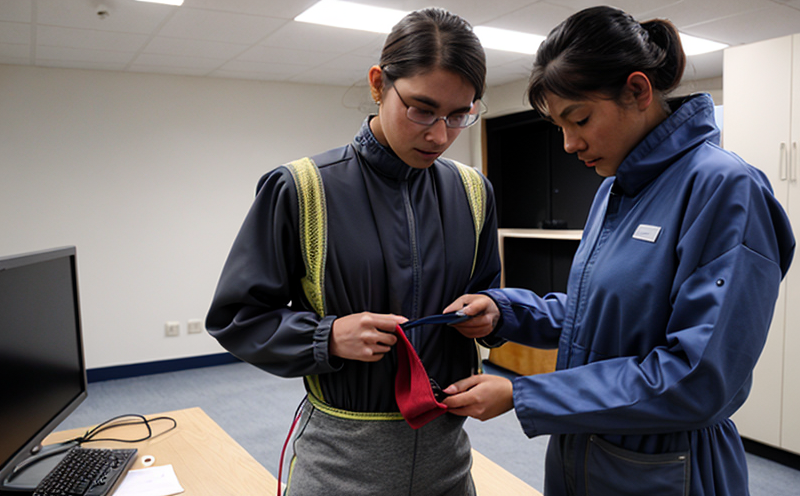GB T 24218 Tensile properties of automotive upholstery fabrics
The GB/T 24218 standard is a crucial document in the textile testing realm, specifically aimed at determining tensile properties for automotive upholstery fabrics. This test method is instrumental in ensuring that materials used in automotive interiors meet the stringent performance requirements set forth by industry standards and regulations.
Automotive upholstery fabrics are subjected to numerous stresses during vehicle use, including mechanical forces from occupants, environmental factors such as temperature changes, and chemical exposure due to cleaning agents. Understanding these tensile properties is vital for manufacturers to design durable, safe, and aesthetically pleasing interiors that can withstand the rigors of daily usage.
The test outlined in GB T 24218 involves subjecting a specimen cut from an automotive upholstery fabric sample to tension until failure occurs. The standard specifies detailed procedures for preparing specimens, mounting them on testing equipment, applying force at a constant rate, and recording the data points that describe the material’s behavior under stress.
Proper specimen preparation is critical; it involves cutting samples in accordance with specified dimensions and orientations relative to grain direction. This ensures consistent test results that reflect accurate properties of the fabric as used in automotive interiors. Testing equipment capable of precise force application and displacement measurement must be utilized, adhering strictly to ISO 6872:1995 standards for tensile testing machines.
The tensile strength and elongation at break are key metrics derived from this test. These values provide insights into the fabric’s ability to resist tearing without stretching excessively or breaking prematurely under typical conditions encountered in a vehicle environment. By comparing results against manufacturer specifications or industry benchmarks, quality managers can ensure compliance with design requirements.
Understanding tensile properties helps automotive manufacturers optimize material selection for various components like seat covers, headrests, and door panels. This knowledge allows them to balance cost considerations with durability needs effectively. For instance, knowing how much force a particular fabric can withstand before failing can inform decisions about whether it’s suitable for high-wear areas or more relaxed regions of the interior.
Additionally, this testing method supports sustainability efforts by helping identify fabrics that offer longer lifecycles and reduced waste generation throughout their lifecycle. Manufacturers adopting sustainable practices could benefit from selecting materials with superior tensile properties, thereby extending product longevity without compromising on performance.
- Eco-friendly materials: By using fabrics with excellent tensile strength, manufacturers can reduce the frequency of replacements needed, leading to lower overall environmental impact.
- Reduced waste: Longer-lasting components mean less frequent disposal or replacement, contributing positively towards reducing landfill contributions.
- Resource efficiency: Selecting fabrics with consistent tensile properties ensures efficient use of raw materials during production processes, minimizing resource wastage.
In summary, the GB/T 24218 standard plays an essential role in quality control and material selection within the automotive upholstery sector. It provides precise measurements that contribute to safer, more durable interiors while supporting broader sustainability goals through informed decision-making based on empirical data.
Benefits
The implementation of GB/T 24218 standards brings numerous advantages not only for manufacturers but also for consumers and the environment. For automobile companies, this standard ensures that upholstery fabrics undergo rigorous testing to guarantee they meet specified performance criteria before being used in vehicles.
From a consumer perspective, products manufactured according to such stringent specifications offer enhanced safety and comfort levels. Vehicles equipped with well-tested upholstery fabrics are less likely to experience premature breakdowns or failures, contributing positively towards overall vehicle reliability. Furthermore, these high-performance materials often enhance the aesthetic appeal of interiors, creating more appealing and inviting spaces for occupants.
The environmental benefits extend beyond just reducing waste; they encompass energy savings during production processes as well. Efficient use of raw materials combined with longer product lifecycles translates into reduced carbon footprints associated with manufacturing and disposal activities. Consumers choosing eco-friendly options supported by robust testing protocols like GB/T 24218 contribute to a more sustainable automotive industry.
For research and development teams working on innovative materials, this standard serves as a benchmark against which new designs can be evaluated. Compliance ensures that any changes made do not compromise the fundamental properties required for safe and effective use in automotive applications. This consistency across generations of products facilitates smoother transitions into market offerings without disrupting established quality standards.
International Acceptance and Recognition
The GB/T 24218 standard enjoys widespread acceptance within the international textile community, particularly in regions where Chinese automotive manufacturing holds significant influence. Its recognition extends beyond national borders due to its alignment with broader global quality assurance frameworks.
One of the key reasons for its international relevance lies in China’s leading position as one of the world’s largest automobile manufacturers and exporters. Many foreign automakers operating plants or sourcing components from China adopt these local standards, seeing them as integral parts of their supply chain management processes. This practice ensures consistency across all production facilities globally.
However, it's important to note that while GB/T 24218 is widely used domestically and in certain export markets, compliance with this standard does not exempt manufacturers from meeting other regional or international requirements set by organizations like the European Union (EU), United States Environmental Protection Agency (EPA), or Japan Automobile Manufacturers Association (JAMA).
For instance, automotive interiors often need to comply simultaneously with multiple standards addressing different aspects such as flammability, durability, and chemical resistance. Therefore, manufacturers must ensure their products satisfy all applicable regulations including GB/T 24218 when relevant.
The acceptance of this standard also reflects a broader trend towards harmonization among various national testing methods aimed at promoting interoperability between different jurisdictions involved in the automotive supply chain. Such efforts contribute to streamlining certification processes, reducing costs for producers, and fostering greater market access opportunities worldwide.





